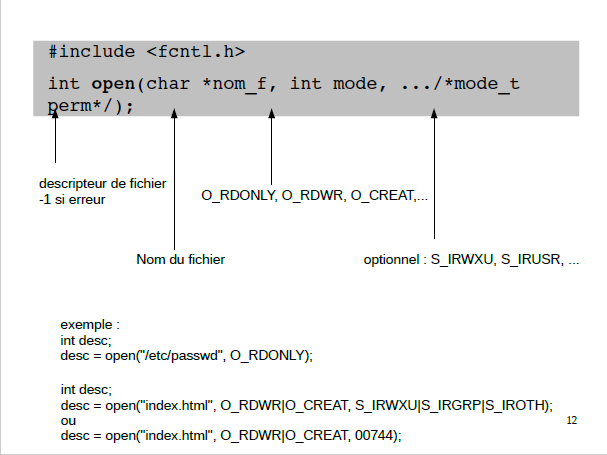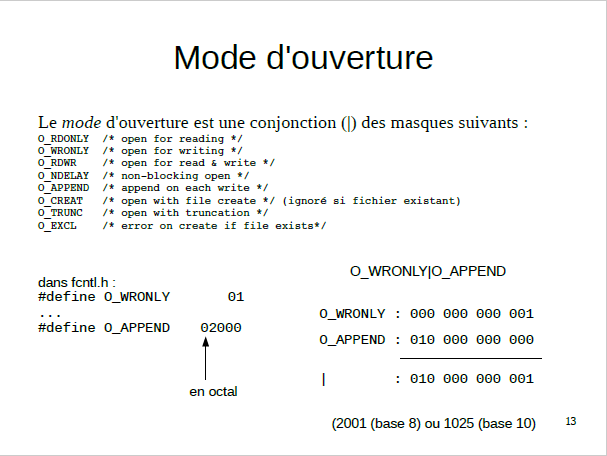Kernel 2.6.22 以降だと /proc/$pid/fdinfo/$fd で確認できるんですね。
[yazekats@yazekats-linux ~]$ touch test.dat [yazekats@yazekats-linux ~]$ perl -e 'sysopen($FH, "./test.dat", O_WRONLY | O_TRUNC | O_CREAT | O_ASYNC | O_DIRECT, 0666);sleep' & [4] 20855 [yazekats@yazekats-linux ~]$ lsof -p 20855 COMMAND PID USER FD TYPE DEVICE SIZE/OFF NODE NAME perl 20855 yazekats cwd DIR 252,3 4096 20447233 /home/yazekats perl 20855 yazekats rtd DIR 252,1 4096 2 / perl 20855 yazekats txt REG 252,1 13200 2903275 /usr/bin/perl perl 20855 yazekats mem REG 252,1 156872 1967400 /lib64/ld-2.12.so perl 20855 yazekats mem REG 252,1 1922152 1967401 /lib64/libc-2.12.so perl 20855 yazekats mem REG 252,1 22536 1967407 /lib64/libdl-2.12.so perl 20855 yazekats mem REG 252,1 145720 1967402 /lib64/libpthread-2.12.so perl 20855 yazekats mem REG 252,1 598680 1967413 /lib64/libm-2.12.so perl 20855 yazekats mem REG 252,1 1488544 3163718 /usr/lib64/perl5/CORE/libperl.so perl 20855 yazekats mem REG 252,1 113952 1967409 /lib64/libresolv-2.12.so perl 20855 yazekats mem REG 252,1 43392 1967427 /lib64/libcrypt-2.12.so perl 20855 yazekats mem REG 252,1 386040 1967426 /lib64/libfreebl3.so perl 20855 yazekats mem REG 252,1 17520 1967412 /lib64/libutil-2.12.so perl 20855 yazekats mem REG 252,1 116368 1967440 /lib64/libnsl-2.12.so perl 20855 yazekats mem REG 252,1 99158576 2884365 /usr/lib/locale/locale-archive perl 20855 yazekats 0u CHR 136,0 0t0 3 /dev/pts/0 perl 20855 yazekats 1u CHR 136,0 0t0 3 /dev/pts/0 perl 20855 yazekats 2u CHR 136,0 0t0 3 /dev/pts/0 perl 20855 yazekats 3r REG 252,3 0 20451124 /home/yazekats/test.dat perl 20855 yazekats 12r FIFO 0,8 0t0 214872 pipe perl 20855 yazekats 13w FIFO 0,8 0t0 214872 pipe [yazekats@yazekats-linux ~]$ cat /proc/20855/fdinfo/3 pos: 0 flags: 02100000
追記(2016/11/20):
/proc/$pid/fdinfo/$fd の flags の読み方
Fichiers
P.12

P.13

include/uapi/asm-generic/fcntl.h
#ifndef _ASM_GENERIC_FCNTL_H #define _ASM_GENERIC_FCNTL_H #include <linux/types.h> /* * FMODE_EXEC is 0x20 * FMODE_NONOTIFY is 0x1000000 * These cannot be used by userspace O_* until internal and external open * flags are split. * -Eric Paris */ /* * When introducing new O_* bits, please check its uniqueness in fcntl_init(). */ #define O_ACCMODE 00000003 #define O_RDONLY 00000000 #define O_WRONLY 00000001 #define O_RDWR 00000002 #ifndef O_CREAT #define O_CREAT 00000100 /* not fcntl */ #endif #ifndef O_EXCL #define O_EXCL 00000200 /* not fcntl */ #endif #ifndef O_NOCTTY #define O_NOCTTY 00000400 /* not fcntl */ #endif #ifndef O_TRUNC #define O_TRUNC 00001000 /* not fcntl */ #endif #ifndef O_APPEND #define O_APPEND 00002000 #endif #ifndef O_NONBLOCK #define O_NONBLOCK 00004000 #endif #ifndef O_DSYNC #define O_DSYNC 00010000 /* used to be O_SYNC, see below */ #endif #ifndef FASYNC #define FASYNC 00020000 /* fcntl, for BSD compatibility */ #endif #ifndef O_DIRECT #define O_DIRECT 00040000 /* direct disk access hint */ #endif #ifndef O_LARGEFILE #define O_LARGEFILE 00100000 #endif #ifndef O_DIRECTORY #define O_DIRECTORY 00200000 /* must be a directory */ #endif #ifndef O_NOFOLLOW #define O_NOFOLLOW 00400000 /* don't follow links */ #endif #ifndef O_NOATIME #define O_NOATIME 01000000 #endif #ifndef O_CLOEXEC #define O_CLOEXEC 02000000 /* set close_on_exec */ #endif /* * Before Linux 2.6.33 only O_DSYNC semantics were implemented, but using * the O_SYNC flag. We continue to use the existing numerical value * for O_DSYNC semantics now, but using the correct symbolic name for it. * This new value is used to request true Posix O_SYNC semantics. It is * defined in this strange way to make sure applications compiled against * new headers get at least O_DSYNC semantics on older kernels. * * This has the nice side-effect that we can simply test for O_DSYNC * wherever we do not care if O_DSYNC or O_SYNC is used. * * Note: __O_SYNC must never be used directly. */ #ifndef O_SYNC #define __O_SYNC 04000000 #define O_SYNC (__O_SYNC|O_DSYNC) #endif #ifndef O_PATH #define O_PATH 010000000 #endif #ifndef O_NDELAY #define O_NDELAY O_NONBLOCK #endif #define F_DUPFD 0 /* dup */ #define F_GETFD 1 /* get close_on_exec */ #define F_SETFD 2 /* set/clear close_on_exec */ #define F_GETFL 3 /* get file->f_flags */ #define F_SETFL 4 /* set file->f_flags */ #ifndef F_GETLK #define F_GETLK 5 #define F_SETLK 6 #define F_SETLKW 7 #endif #ifndef F_SETOWN #define F_SETOWN 8 /* for sockets. */ #define F_GETOWN 9 /* for sockets. */ #endif #ifndef F_SETSIG #define F_SETSIG 10 /* for sockets. */ #define F_GETSIG 11 /* for sockets. */ #endif #ifndef CONFIG_64BIT #ifndef F_GETLK64 #define F_GETLK64 12 /* using 'struct flock64' */ #define F_SETLK64 13 #define F_SETLKW64 14 #endif #endif #ifndef F_SETOWN_EX #define F_SETOWN_EX 15 #define F_GETOWN_EX 16 #endif #ifndef F_GETOWNER_UIDS #define F_GETOWNER_UIDS 17 #endif #define F_OWNER_TID 0 #define F_OWNER_PID 1 #define F_OWNER_PGRP 2 struct f_owner_ex { int type; __kernel_pid_t pid; }; /* for F_[GET|SET]FL */ #define FD_CLOEXEC 1 /* actually anything with low bit set goes */ /* for posix fcntl() and lockf() */ #ifndef F_RDLCK #define F_RDLCK 0 #define F_WRLCK 1 #define F_UNLCK 2 #endif /* for old implementation of bsd flock () */ #ifndef F_EXLCK #define F_EXLCK 4 /* or 3 */ #define F_SHLCK 8 /* or 4 */ #endif /* operations for bsd flock(), also used by the kernel implementation */ #define LOCK_SH 1 /* shared lock */ #define LOCK_EX 2 /* exclusive lock */ #define LOCK_NB 4 /* or'd with one of the above to prevent blocking */ #define LOCK_UN 8 /* remove lock */ #define LOCK_MAND 32 /* This is a mandatory flock ... */ #define LOCK_READ 64 /* which allows concurrent read operations */ #define LOCK_WRITE 128 /* which allows concurrent write operations */ #define LOCK_RW 192 /* which allows concurrent read & write ops */ #define F_LINUX_SPECIFIC_BASE 1024 #ifndef HAVE_ARCH_STRUCT_FLOCK #ifndef __ARCH_FLOCK_PAD #define __ARCH_FLOCK_PAD #endif struct flock { short l_type; short l_whence; __kernel_off_t l_start; __kernel_off_t l_len; __kernel_pid_t l_pid; __ARCH_FLOCK_PAD }; #endif #ifndef CONFIG_64BIT #ifndef HAVE_ARCH_STRUCT_FLOCK64 #ifndef __ARCH_FLOCK64_PAD #define __ARCH_FLOCK64_PAD #endif struct flock64 { short l_type; short l_whence; __kernel_loff_t l_start; __kernel_loff_t l_len; __kernel_pid_t l_pid; __ARCH_FLOCK64_PAD }; #endif #endif /* !CONFIG_64BIT */ #endif /* _ASM_GENERIC_FCNTL_H */
普通に lsof で良かったもよう。
$ perl -e 'while(1){printf(qq/%s\n/,q/1/);sleep 10}' > foo.txt $ lsof +fg -p 32767 COMMAND PID USER FD TYPE FILE-FLAG DEVICE SIZE/OFF NODE NAME (中略) perl 32767 oracle 1w REG W,LG 202,3 0 3522585 /home/oracle/foo.txt (中略) $ lsof +fg ~/foo.txt COMMAND PID USER FD TYPE FILE-FLAG DEVICE SIZE/OFF NODE NAME perl 32767 oracle 1w REG W,LG 202,3 0 3522585 /home/oracle/foo.txt $ strace -e open lsof +fg -p 32767 2>&1|grep fdinfo open("/proc/1147/fdinfo/3", O_RDONLY) = 4 open("/proc/32767/fdinfo/0", O_RDONLY) = 7 open("/proc/32767/fdinfo/1", O_RDONLY) = 7 open("/proc/32767/fdinfo/2", O_RDONLY) = 7
参考
- io - How to tell if a given process opened files with O_DIRECT? - Stack Overflow
- GitHub - ac000/fdflags: Simple utility to show the open(2) flags for a file/dir
- O_DIRECT & O_ASYNC, Linux & Perl: perldev
- proc(5) - Linux manual page
- proc: extend /proc/<pid>/fdinfo/<fd> [LWN.net]
- How to find out which flags the process used to open a file?
- Linux, DevOps, Middleware and Cloud: Which access modes/flags a file was opened by an application
- linux - Is it possible to determine which fds a process has open for reading vs. writing via procfs? - Stack Overflow